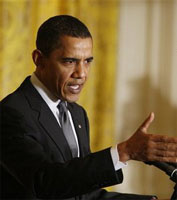In his re-election speech, President Obama, amidst enthusiastic cheers, made the following declaration to his audience and to all America:
I believe we can keep the promise of our founders, the idea that if you’re willing to work hard, it doesn’t matter who you are or where you come from or what you look like or where you love. It doesn’t matter whether you’re black or white or Hispanic or Asian or Native American or young or old or rich or poor, able, disabled, gay or straight, you can make it here in America if you’re willing to try.
As he built to a crescendo, so did the excitement of the crowd. It was a euphoric moment. Unnoticed, however, was an egregious omission: “born or unborn.” The President’s embracing liberality stopped short at a critical point. The unborn, of course, cannot vote. They are not within the President’s political purview. Those who will be aborted will never have a chance either to vote or “to make it in America.”
 G. K. Chesterton famously spoke of the “democracy of the dead,” an expanded notion of democracy that honors the legacy of ideas and institutions that today’s generation has inherited. The now dead were once alive, and, like America’s Founding Fathers, contributed mightily to posterity.
G. K. Chesterton famously spoke of the “democracy of the dead,” an expanded notion of democracy that honors the legacy of ideas and institutions that today’s generation has inherited. The now dead were once alive, and, like America’s Founding Fathers, contributed mightily to posterity.
The unborn, given a chance, can also contribute to posterity. Without realizing it, Obama’s audience was cheering for “exclusive inclusivism.” Would it be “extremist” to honor the unborn? Many think so, and this illiberal attitude is one way of understanding the root of America’s deep division.
The history of democracy is interwoven with the history of exclusion, and we do not need to recapitulate the lengthy list of those groups that were systematically and unjustly excluded. Excluding the unborn, however, is the largest of all exclusions since it excludes everyone, at least for the first nine months of their existence.
Christianity, including sinners, as well as the “halt and the lame,” is far more democratic in its inclusivity than any political democracy has ever been. Being a non-political institution, however, it is not held together by votes. It is held together by a mandate from God to love everyone, including the “least” of God’s “little ones.” One salutary influence that Christianity can have on secular politics, and has had throughout the ages, is to urge inclusion of groups that have been routinely excluded.
Christianity, though very much concerned about worldly affairs, such as “making it in America,” is far more concerned about personal salvation. And God wills the salvation of everyone. St. Augustine’s cities of God and Man clash when the latter is ascribed greater importance than the former. Secular democracy is always limited. Because it inevitably excludes certain groups, it fails to accord the members of such groups the dignity and liberty they justly deserve.
President Obama’s egregious exclusion of the unborn, not only in his acceptance speech, but in his personal opinion and in his political platform, leads us to recall and reflect on the superiority of the spiritual power that belongs to the City of God, over the temporal power that belongs to the City of Man. In his book, The Things that are Not Caesar’s, Jacques Maritain expresses the point eloquently and passionately:
Nothing is more important for the freedom of souls and the good of mankind than properly to distinguish between these two powers: nothing, in the language of the day, has so great a cultural value. It is common knowledge that the distinction is the achievement of the Christian centuries and their glory.
CLICK LIKE IF YOU’RE PRO-LIFE!
It is encouraging to remember that politics is not religion, and should not presume to be so, and that Christianity will continue to be a source of light and hope for all the well-intentioned democracies that suffer from their own inevitable inadequacies. It is also consoling to recollect that terms of political office are temporary, while God’s term of office is eternal.
LifeNews Note: Dr. Donald DeMarco is a Senior Fellow of Human Life International. Doctor DeMarco is a member of the Pontifical Academy for Life and he is Professor Emeritus at St. Jerome’s University in Waterloo, Ontario and an adjunct professor at Holy Apostles College & Seminary in Cromwell, CT. He is the author of 22 books. Reprinted with permission from Human Life International’s Truth and Charity Forum.







